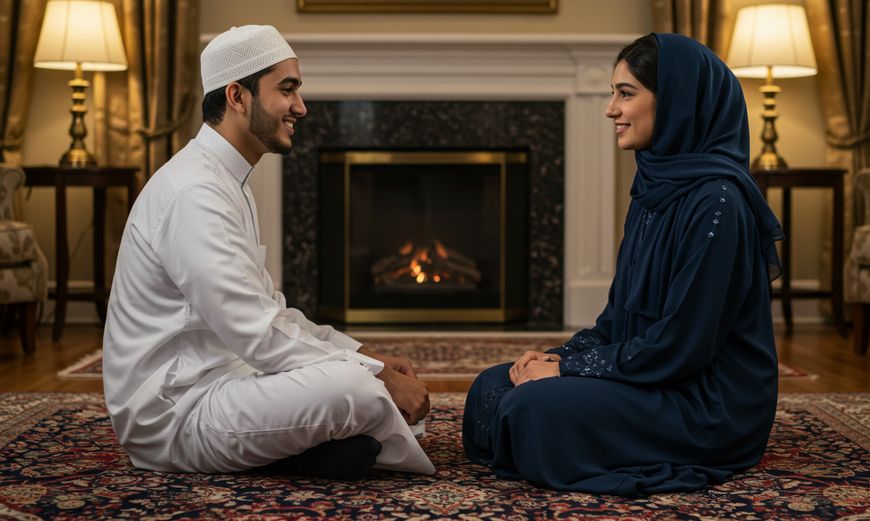How to Find a Spouse in Islam: A Comprehensive Guide
Finding a life partner is one of the most significant decisions you'll ever make. In Islam, marriage isn't just a social contract—it's a sacred bond that completes half of your faith. The Prophet Muhammad (peace be upon him) said, "When a man marries, he has fulfilled half of his religion." But in today's world, many Muslims find themselves asking: how do I actually find the right person? How to find a spouse in Islam while staying true to our values and principles?
If you're reading this, chances are you're ready to take this important step in your life. Maybe you've been making dua for years, or perhaps you're just beginning to think seriously about marriage. Either way, this guide will walk you through the Islamic approach to finding a partner—one that honors our traditions while acknowledging the realities of modern life.
Understanding Marriage in Islam
Before diving into the practical steps of how to find a partner in Islam, it's essential to understand what marriage means from an Islamic perspective. Marriage in Islam is described as a source of tranquility, mercy, and love. Allah says in the Quran, "And of His signs is that He created for you from yourselves mates that you may find tranquility in them; and He placed between you affection and mercy" (30:21).
This beautiful verse reminds us that finding a spouse isn't just about fulfilling a social obligation or following a checklist. It's about finding someone who brings peace to your heart, someone with whom you can build a life of mutual respect, love, and worship of Allah together.
Marriage is also considered a form of worship in Islam. When done with the right intention, even the most ordinary moments of married life—sharing a meal, raising children, supporting each other through challenges—become acts of devotion. This perspective should shape how we approach the search for a life partner.
Step 1: Prepare Yourself First
One of the most overlooked aspects of how to find spouse in islam is the importance of self-preparation. Before you start looking for someone else, you need to work on becoming the person you want to attract. This isn't about physical transformation alone—it's about spiritual, emotional, and personal growth.
Start by strengthening your relationship with Allah. Are you consistent with your prayers? Do you regularly read the Quran? Are you working on your character and treating people with kindness and respect? The quality of your spiritual life will directly impact the quality of your marriage. A person who is close to Allah will attract someone who shares similar values and priorities.
Make dua consistently and sincerely. Ask Allah to guide you to the right person at the right time. The Prophet (peace be upon him) taught us specific duas for important life decisions, and marriage certainly qualifies as one. Trust in Allah's timing—sometimes delays are divine protection, saving us from matches that would have brought us harm.
Financial and emotional stability also matter. While you don't need to be wealthy, you should be responsible and capable of supporting a family (this applies primarily to men, though women should also be financially aware). Work on your education, career, and life skills. Develop emotional maturity by working through past traumas, building healthy communication skills, and learning to manage conflict constructively.
Step 2: Be Clear About What You're Looking For
Many people struggle with how to find a partner in islam because they don't know what they're actually looking for. They have vague notions of "a good Muslim" without defining what that means to them specifically.
Sit down and think seriously about your priorities. What qualities are non-negotiable? For most Muslims, this includes someone who prays regularly, has good character (akhlaq), and shares similar life goals. Beyond these basics, consider what's important to you personally. Do you value education? A particular cultural background? Someone who shares your hobbies or interests?
The Prophet (peace be upon him) said that people choose spouses for four reasons: wealth, lineage, beauty, and religion—and he advised us to prioritize religion above all else. This doesn't mean the other factors don't matter, but they shouldn't be the primary criteria. A beautiful, wealthy person with poor character will make your life difficult, while someone with strong faith and good manners will be a blessing even if they're not perfect in other ways.
Be realistic, though. Everyone has flaws, and the perfect person doesn't exist. Think about what you can be flexible on and what you can't compromise. Write it down if it helps. Having clarity will save you time and emotional energy as you navigate the search process.
Step 3: Explore Halal Avenues for Meeting Potential Spouses
Now comes the practical part: where and how to find a spouse in Islam? The good news is that you have several halal options, both traditional and modern.
Family and Friends: This is perhaps the most traditional and still one of the most effective methods. Let your family, friends, and trusted community members know that you're looking to get married. Many successful marriages start through introductions from people who know both parties well. There's wisdom in this approach—someone who knows you personally can make better matches than a stranger on the internet.
Don't be shy about this. In Islamic culture, seeking marriage is something honorable, not embarrassing. If you have married friends or relatives, ask if they know anyone suitable. Aunties often love playing matchmaker, and while their suggestions might not always be perfect, they sometimes surprise you.
The Mosque and Community Events: Your local mosque and Islamic centers often host events, classes, and programs where you can meet other practicing Muslims. While these aren't explicitly matchmaking events, they provide opportunities to meet people who share your values. Volunteer for community service projects, attend Islamic lectures, or join study circles. You might meet someone directly, or others in the community might notice you and think of someone to introduce you to.
Muslim Matrimonial Services: There are now numerous halal matrimonial websites and apps designed specifically for Muslims seeking marriage. Services like Muzmatch, Minder, Half Our Deen, and traditional matrimonial websites have helped countless Muslims find spouses while maintaining Islamic guidelines.
These platforms allow you to filter by religious practice, location, ethnicity, and other factors. The key is to use them properly—be honest in your profile, maintain appropriate boundaries in communication, and involve your family at the appropriate time. Don't treat these apps like casual dating platforms. The conversations should be purposeful and directed toward determining compatibility for marriage.
Professional Matchmakers: Some communities have professional Muslim matchmakers who maintain databases of singles and arrange introductions. While this might involve a fee, it can be worth it for the personalized service and vetting process they provide.
Step 4: The Halal Way of Getting to Know Someone
Once you've identified a potential match, the next question is: how do you get to know them while maintaining Islamic boundaries? This is where many people struggle with how to find spouse in islam in a modern context.
Islam encourages you to get to know a potential spouse before marriage, but within appropriate limits. The process should be purposeful, chaperoned, and directed toward making a decision about marriage—not casual dating with no commitment.
Initial conversations can happen in the presence of family members or in public settings like coffee shops. Many couples today have their first meetings in cafes with a family member sitting at a nearby table—close enough to maintain propriety but far enough to allow conversation. Some families prefer all conversations to happen with a parent or sibling present.
Phone or video calls are common today and can be acceptable with the right intentions and boundaries. Keep conversations focused on important topics: religious practice and beliefs, life goals, views on marriage and family, financial expectations, where you'll live, career plans, and how you handle conflict.
Don't spend months in this getting-to-know-you phase. Islamic tradition encourages relatively short engagement periods—long enough to make an informed decision but not so long that you're testing Allah's boundaries. A few weeks to a few months is usually sufficient if you're having substantive conversations.
Step 5: Pray Istikhara and Seek Counsel
Istikhara is the prayer for guidance that Muslims are encouraged to perform when making important decisions. After you've done your due diligence—met the person, asked important questions, involved your family—turn to Allah and ask Him to guide you to what's best.
Many people misunderstand Istikhara, thinking they'll receive a dream or clear sign. Sometimes that happens, but more often, Allah guides you through your feelings, circumstances, and the advice of wise people. After praying Istikhara, pay attention to how things unfold. Do doors open easily, or do obstacles keep appearing? Do you feel peace about the decision, or persistent unease?
Also seek counsel from people who know you well and have your best interests at heart—parents, mentors, married friends who have good marriages. They can often see things you're too emotionally involved to notice. The Quran advises us to consult with others in our affairs, and marriage is certainly something worth consulting about.
Step 6: Involve Your Family Appropriately
In Islamic tradition, families play a significant role in the marriage process, and there's wisdom in this. Your family knows you, loves you, and can provide perspective that friends or the person you're interested in cannot.
This doesn't mean your family should choose your spouse for you—Islam clearly gives both men and women the right to accept or refuse a proposal. But it does mean including them in the process, seeking their blessings, and taking their concerns seriously.
If your family has objections to someone you're interested in, don't immediately dismiss their concerns as old-fashioned or unreasonable. Try to understand where they're coming from. Sometimes parents see red flags that you're too infatuated to notice. Other times, their concerns might be based on cultural preferences rather than religious requirements, and you might need to have respectful conversations about that.
The goal is to find a balance—honoring your family while also exercising your own judgment and right to choose. Most importantly, work toward getting your family's blessing. A marriage that starts with family discord faces unnecessary challenges from day one.
Common Challenges and How to Overcome Them
Many people face obstacles when learning how to find a partner in islam. Let's address some common ones:
"I'm getting older and everyone around me is getting married." Remember that Allah's timing is perfect. Comparison is the thief of joy—your path is uniquely yours. Use this time to work on yourself and trust that the right person will come at the right time.
"My family's cultural expectations conflict with what I want." This requires wisdom and diplomacy. Stand firm on Islamic principles while showing respect for your family's perspective. Sometimes you need to educate them about what Islam actually requires versus what's cultural tradition.
"I can't find practicing Muslims in my area." Consider expanding your search geographically, especially with online matrimonial services. Many Muslim couples today meet across cities or even countries and make arrangements to relocate after marriage.
"I've been hurt before and I'm afraid to try again." Healing takes time. Work through past hurt with support from counselors, trusted friends, or Islamic scholars. Don't let one bad experience prevent you from seeking the companionship and blessing that marriage can be.
Final Thoughts
Learning how to find a spouse in Islam is ultimately about balancing trust in Allah with taking practical steps. It's about maintaining your Islamic values while engaging with the modern world. It's about preparing yourself to be a good spouse while seeking someone who will be good for you.
Remember that marriage is a journey, not a destination. Even after you find the right person and get married, you'll continue growing together, facing challenges, and deepening your bond. The search for a spouse is just the beginning of a lifelong adventure of companionship, love, and mutual support in worship of Allah.
Make sincere dua, take practical steps, maintain your boundaries, involve your family, and trust in Allah's plan. The Prophet (peace be upon him) said, "The best of you are those who are best to their wives." Focus on becoming that best version of yourself, and Allah will bring you someone who appreciates and complements you.
May Allah grant you a righteous spouse who is the coolness of your eyes and a means of drawing closer to Him. May your search be easy and your marriage be blessed with love, mercy, and tranquility. Ameen.



